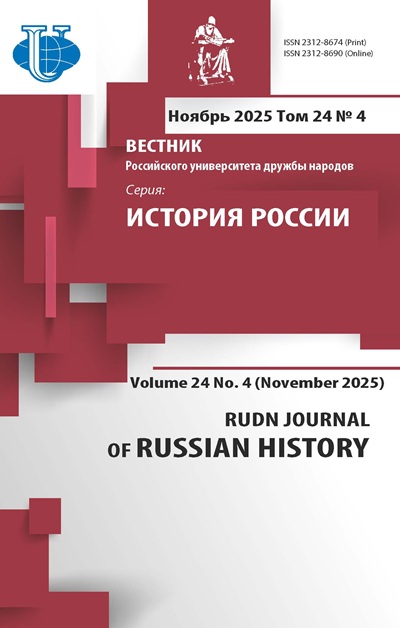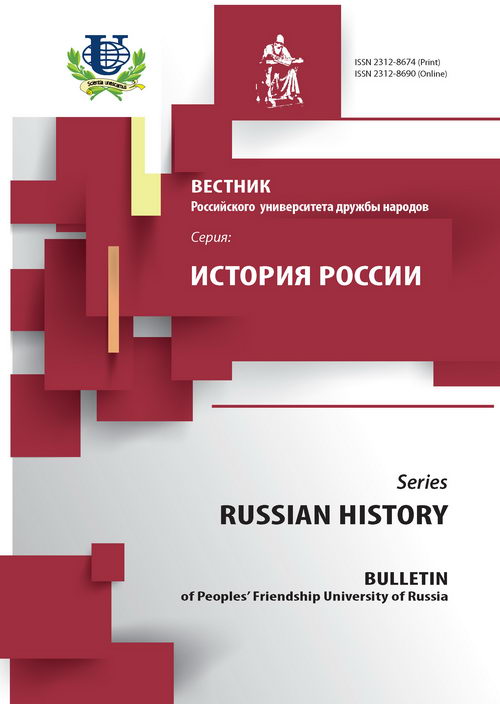№ 3 (2008)
- Год: 2008
- Статей: 16
- URL: https://journals.rudn.ru/russian-history/issue/view/261
СТАТЬИ
Политический прагматизм Патриарха Филарета в контексте «Соборного уложения» 1620 г. и требника Московского печатного двора 1624 г.
Аннотация
В статье показано, что в контексте общественно-политических, юридических и социокультурных практик 1620-1630-х гг. два документа, посвященные частному богословскому сюжету (изменению правил принятия в православие лиц иного вероисповедания), дают информацию о политическом прагматизме патриарха Филарета, их инициатора или автора.
Вестник Российского университета дружбы народов. Серия: История России. 2008;(3):5-16
 5-16
5-16


«На выборы смотрел как на дело семейное…»: реализация избирательных прав дворянства в первой половине XIX в. (по материалам Среднего Поволжья)
Аннотация
В статье рассматривается социально-политическое развитие дворянства Среднего Поволжья в первой половине XIX века. Исследовав особенности проведения дворянских выборов в Пензенской и Симбирской губерниях, автор устанавливает, насколько реальными были в российской провинции сословное самоуправление и представительство дворян в государственных структурах накануне Великих реформ.
Вестник Российского университета дружбы народов. Серия: История России. 2008;(3):17-23
 17-23
17-23


«Всегда бедны и безденежны»: сельские сходы как элемент фискальной системы на рубеже XIX-ХХ вв.
Аннотация
В статье рассматриваются фискальные функции сельских сходов в Российской империи на рубеже XIX-ХХ вв. Дается характеристика понятия «сельский сход», анализируются основные направления деятельности сельского самоуправления, особенности принятия решений по важнейшим вопросам «крестьянского мира», способы борьбы с недоимками среди сельских обывателей. Внимание обращено на проблему коррупции среди сельских должностных лиц.
Вестник Российского университета дружбы народов. Серия: История России. 2008;(3):24-33
 24-33
24-33


Политические партии и массовое сознание в русской революции (на материалах Самарской, Саратовской и Симбирской губерний в 1905-1907 и 1917 гг.)
Аннотация
Статья посвящена анализу взаимодействия политических партий и массового сознания в ходе революционных событий 1905-1907 и 1917 гг. в Самарской, Саратовской и Симбирской губерниях. Массовое сознание являлось своеобразным социокультурным базисом революционного процесса, определявшим параметры и вектор его развития. Судьба той или иной политической партии в русской революции, как и исход самой революции, зависели от степени их соответствия предлагаемых ими идей, лозунгов, моделей поведения мировоззренческим императивам, эмоциям и настроениям народных масс России.
Вестник Российского университета дружбы народов. Серия: История России. 2008;(3):34-42
 34-42
34-42


Политические настроения рабочих и инженеров в годы «хрущевской оттепели» (на материалах Горьковской области)
Аннотация
The article of Gorkiy's region material has opened a problem which contacts with worker's and engineer's reaction on the most important politician events in the life of the Soviet Union in 1953-1964 years. Besides it has showed contradictions in the system of relationships between political power and Soviet's workers.
Вестник Российского университета дружбы народов. Серия: История России. 2008;(3):43-50
 43-50
43-50


Конфессиональные основы деловой культуры и делового поведения предпринимательских сообществ в России XVIII-XIX вв.
Аннотация
Статья посвящена выявлению связей религиозных факторов с формированием и эволюцией российской деловой культуры. Для выяснения механизмов и содержания такого воздействия выявляются черты делового поведения, его особенности для разных этноконфессиональных групп российских предпринимателей (немцев, евреев, старообрядцев и пр.) в корреляции с системами религиозно-этических ценностей и институтов этих сообществ.
Вестник Российского университета дружбы народов. Серия: История России. 2008;(3):51-64
 51-64
51-64


Министерство как орган государственного управления в 1965-1970 гг. (на материалах Министерства легкой промышленности СССР)
Аннотация
В 1965 году руководство СССР приняло решение о восстановлении отраслевой системы управления народным хозяйством и начинает внедрение новых методов планирования и экономического стимулирования на предприятиях. Министерства должны были обеспечить высокую производительность предприятий и успешно реализовать реформу А.Н. Косыгина. Рассмотрим, каково было место, отведенное министерствам в системе государственного управления, как нормативно определенные для них права и обязанности позволяли достичь этих целей.
Вестник Российского университета дружбы народов. Серия: История России. 2008;(3):65-71
 65-71
65-71


«С кабаком и скоморохами»: девиантное поведение русского человека XVI-XVII вв. в церкви и во время религиозных праздников
Аннотация
В XVI-XVII вв. в Русском государстве формируется «предписанное» православие. В документах светской и церковной власти закрепляется порядок взаимоотношений человека с верой и церковью. Но источники этого времени фиксируют и многочисленные отступления от религиозных обычаев. В статье рассматривается один из аспектов нарушения русским человеком XVI-XVII вв. норм праведного поведения - его «бесчинства» во время богослужений и церковных праздников (пьянство, драки, грубые забавы).
Вестник Российского университета дружбы народов. Серия: История России. 2008;(3):72-81
 72-81
72-81


Историческая социомобильность и многообразие миграций населения Центрального Черноземья в 1861-1917 гг.
Аннотация
Статья содержит основы новаторской концепции по целостной характеристике всего многообразия перемещений людей за 1861-1917 гг. На примере Центрально-Черноземного региона освещен комплекс трудовых миграций, воинские и учебные, религиозные и репрессивные, исход беженцев Первой мировой войны.
Вестник Российского университета дружбы народов. Серия: История России. 2008;(3):82-92
 82-92
82-92


Роль религиозного фактора в осуществлении геноцида армянского народа в 1915 году
Аннотация
Геноцид армянского народа, осуществленный младотурецким правительством Османской Турции, имел и религиозный оттенок. Младотурки в основе своей политики во главу угла ставили идеалы панисламизма и пантюркизма. Армян истребляли именно за то, что они были христианами Армянской церкви. Именно этим объясняется факт первичного уничтожения представителей армянского духовенства и уничтожения культовых зданий Армянской церкви. Даже когда под сильным давлением небольшая часть армян приняла ислам, они все же также подверглись депортации как армяне-мусульмане.
Вестник Российского университета дружбы народов. Серия: История России. 2008;(3):93-98
 93-98
93-98


Сотрудничество стран - участниц СНГ в области образования
Аннотация
Формирование в 90-е годы общего образовательного пространства государств - участников СНГ стало для них важнейшей гуманитарной задачей. 17 января 1997 г. Совет глав правительств Содружества утвердил Концепцию формирования единого (общего) образовательного пространства СНГ. Работа государственных органов СНГ в этом направлении имела позитивные результаты, несмотря на неразрешенность многих проблем в данной сфере. В XXI в. сотрудничество стран - участниц СНГ в области образования значительно активизировалось, есть довольно значительные факты и примеры решения этой задачи.
Вестник Российского университета дружбы народов. Серия: История России. 2008;(3):99-106
 99-106
99-106


Организация и повседневная работа с молодежью - актуальная потребность и гарантия будущего России. К итогам Х Всероссийской научно-практической конференции, посвященной 50-летию РУДН, «Молодежь в истории России: духовные, нравственные и патриотические ориентиры». Москва, РУДН, 16 апреля 2008 г.
Вестник Российского университета дружбы народов. Серия: История России. 2008;(3):107-110
 107-110
107-110


Реализация федерального проекта как шаг к диалогу культур: РУДН в общероссийском конкурсе инновационных образовательных программ
Вестник Российского университета дружбы народов. Серия: История России. 2008;(3):111-112
 111-112
111-112


Основные научно-методические публикации, доклады и сообщения на научных конференциях, публикации преподавателей кафедры истории России РУДН за 2007 г.
Вестник Российского университета дружбы народов. Серия: История России. 2008;(3):113-115
 113-115
113-115


Верность делу, порядочность и энергия. Рафаэлю Амировичу Арсланову - 60 лет!
Вестник Российского университета дружбы народов. Серия: История России. 2008;(3):116-120
 116-120
116-120


Наши авторы
Вестник Российского университета дружбы народов. Серия: История России. 2008;(3):121-121
 121-121
121-121
















